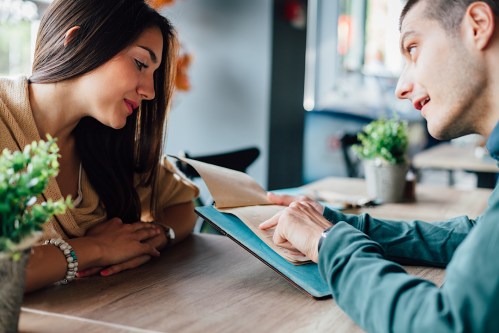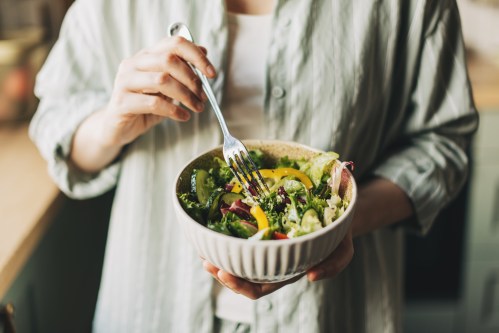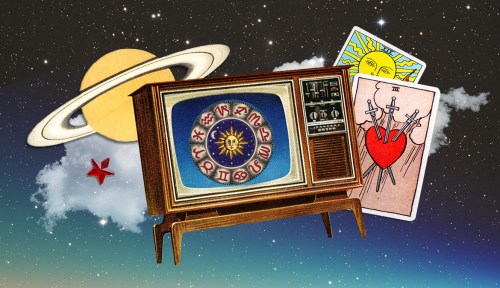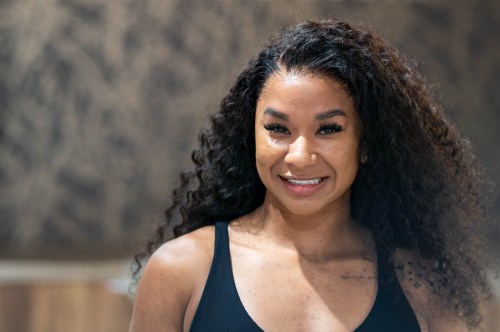So you’re out for dinner with your partner, and you can’t help but look between their plate and yours. Are you eating more than them? “Too much?” Are they judging you for choosing an option with more calories? If you’ve experienced any of this, you’re not alone, and having some tips to ease discomfort about eating more than the person you’re dining with can help in the moment.
Thanks to diet culture, societal expectations around gender, and more, many people struggle with comparison and discomfort around food. As someone who’s experienced this, I’ve personally found some of Rini Frey’s Instagram posts encouraging, where she reminds people that it’s okay to eat the same meal as your partner, more than your partner, and what and however much you want. (In short, it’s not as heavy as it may feel.)
This situation can still bring up anxiety, however, which is totally understandable. And here’s another bummer: Even if you’re allowing yourself to eat as much as you want, you may still be dealing with mental restriction, which can hurt your relationship with food. So how can you win? Below, experts explain the normalcy and reasons behind your unease, as well as what can help you worry less about food so you can enjoy experience of eating more.
Why eating more may make you feel uncomfortable
You may be reluctant to (or feel awkward about) eating more than your partner for a variety of reasons, one of which includes a history of similar feelings. “Individuals who struggle with body image, disordered/unhealthy eating patterns, and/or have clinically diagnosed eating disorders often find themselves comparing their own body shape and weight to others,” says Stephanie Carlyle, a licensed clinical professional counselor at Thriveworks in Baltimore, Maryland, who specializes in eating disorders, women’s issues, relationships, and stress. “Additionally, it is not uncommon for these individuals to compare what they eat to what others eat.”
If you haven’t dealt with that, another factor could be at play: societal expectations and stereotypes. “This also exists outside the gender binary: Being small is associated with femininity, and being big is associated with masculinity,” says Christine Byrne, MPH, RD, a Raleigh-based registered dietitian who specializes in eating disorders. “Because we so closely associate food intake with body size—even though body size is about so much more than what and how much you eat—there’s an expectation that women and femmes need less food than their male partners.”
This indoctrination of sorts starts early. Carlyle says it could be more covert, like your dad being served a larger portion than your mom at dinner. Or, it could be more direct, such as someone asking a girl if she’s “going to eat all that” while praising a boy for eating a lot because “it’ll make him big and strong.”
It’s also important to note that women who date women aren’t immune to this, either. “Unfortunately, women are often taught from the time of childhood that eating less is what females ‘should’ do,” Carlyle says. “We are socialized that this is the ‘feminine,’ ‘proper,’ or ‘right’ thing to do.” As a result, women may inadvertently trigger each other’s disordered behaviors by eating little or feeling like they’ll be judged for eating more or “a lot.”
All in all, diet culture and its many ideals are simply (and unfortunately) hard to avoid. “In diet culture, eating less is often seen as morally superior,” Byrne adds. “Of course that’s ridiculous, because we all need food.”
5 tips to ease discomfort about eating more than others
While many of the messages floating around can complicate your ability to eat intuitively with a partner (or anyone, for that matter), mindfulness and reminding yourself of key truths can help you get through the meal with more ease. Here’s what Carlyle and Byrne suggest:
1. Ask yourself if the thought is helpful
…Because if not, it’s probably not of any use. Basically, ask yourself why you’re having the thought, and if a “should” is involved. “When we are ‘shoulding’ on ourselves, that’s a good indicator that we need to take a moment to explore how that thought is serving us,” Carlyle says. “For example, if I’m out on a first date and I think, ‘Wow, that burger looks great, but I should probably get a salad instead.” It can be very healthy to ask ourselves the ‘why’ behind this.” If your “why” has to do with your date judging you, move to tip number two. (Also, if another person is making you feel bad about something as unimportant as what you want to eat, you deserve better! Just saying!)
2. Remind yourself that what you eat has nothing to do with your worth
As understandable as it is that many of us have conflated our self-esteem with our food intake—thanks again, diet culture—remember that the two couldn’t be more unrelated. “How much you eat has absolutely no bearing on your identity, your worth as a person, or the strength and quality of your relationship,” Byrne says. Just as you probably wouldn’t feel bad about going to the bathroom more than your partner, she adds, you don’t need to feel bad about eating more than them.
3. Focus on the experience (and remember your partner probably is, too)
When it comes down to it, going out on a date is about having fun with, and getting to know, the other person, right? Try to be mindful of those aspects. What are you learning about your partner? What are you enjoying? Carlyle says your partner is likely focused on that, too. The menu doesn’t need to be part of the equation (unless it’s about how tasty the dessert is!).
4. Consider talking to a therapist or anti-diet dietitian
While there’s a lot of work you can do on your own, working with a health provider can oftentimes provide extra support. “If you are struggling with these types of thoughts, it may be helpful to connect with a mental health professional to work on developing healthier thoughts, feelings, and behaviors,” Carlyle says. For more affordable therapists, you can check out the Open Path Collective database.
5. Remember that every body has different needs
Ultimately, your best bet in real time is to listen to your body. What does it need (and want)? “We all have different metabolisms, activity levels, hormone levels, health statuses, appetites, and more,” Byrne says. “If you’re trying to give your body what it needs and feel comfortably full after eating, the best way to gauge how much to eat is to listen to internal hunger and fullness cues, not external cues, like how much everyone else is eating.”
Carlyle agrees. “It is important to remember that if we all ate the exact same thing as one another all of the time, we would still likely have very different bodies than one another,” she says. “You cannot determine the nutrients that your body needs based on what someone else’s intake is.”
Sign Up for Our Daily Newsletter
Get all the latest in wellness, trends, food, fitness, beauty, and more delivered right to your inbox.
Got it, you've been added to our email list.











